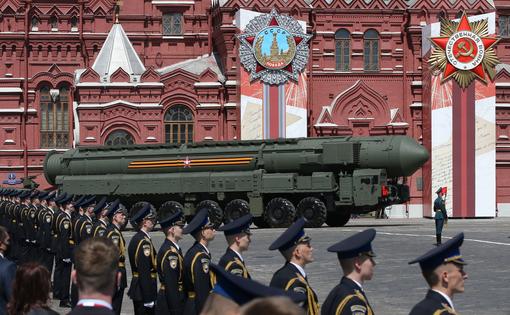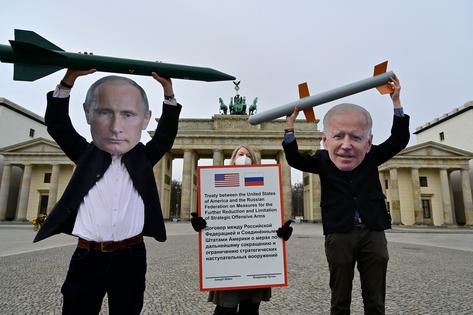Russia is violating the last remaining nuclear treaty with the US, according to Washington
Published in Political News
After decades of progress on limiting the buildup of nuclear weapons, Russia’s war on Ukraine has prompted renewed nuclear tensions between Russia and the U.S.
The U.S. State Department told Congress on Jan. 31, 2023, that Russia is not complying with the countries’ last remaining nuclear arms agreement, which was renewed for five years in 2021. Russia has denied these accusations and accused the U.S. of violations as well.
This agreement, known as New START, is critical to nuclear cooperation and preventing a new arms race. It is the only remaining agreement between the U.S. and Russia limiting the development of nuclear weapons and their delivery systems. It allows both countries to regularly, and with limited advance notice, inspect each other’s nuclear weapons arsenals.
Russian President Vladimir Putin has repeatedly ignited concern that Russia’s setbacks during its nearly year-old war with Ukraine – as well as Western involvement in the conflict – could result in Russia launching a nuclear attack on Ukraine or another country in the West.
A single nuclear weapon today in a major city could immediately kill anywhere from 52,000 to several million people, depending on the weapon’s size.
I have worked on and researched nuclear nonproliferation for two decades.
Convincing countries to reduce their nuclear weapons stockpiles or renounce the pursuit of this ultimate weapon has always been extremely difficult.
The Soviet Union, U.S., United Kingdom, France, Israel and China had active nuclear weapons programs in the 1960s.
Countries recognized the risk of a nuclear war in the future.
Sixty-two countries initially agreed to what’s been called the “Grand Bargain” in 1967, an essential element of the Treaty on the Nonproliferation of Nuclear Weapons. One hundred and ninety-one countries eventually signed this treaty.
The agreement prevented the spread of nuclear weapons to countries that didn’t already have them by 1967. Countries with nuclear weapons, like the U.S. and the U.K., agreed to end their nuclear arms race and work toward eventual disarmament, meaning the destruction of all nuclear weapons.
This landmark agreement laid the groundwork for agreements between the U.S. and the Soviet Union to further reduce their nuclear weapons and their delivery systems. It also stopped other countries from developing and testing nuclear weapons until the end of the Cold War.
Israel, India and Pakistan never joined the agreement due to regional security concerns. They all now possess nuclear weapons. North Korea withdrew from the agreement and developed nuclear weapons.
There have been major achievements in preventing countries from gaining nuclear weapons and dramatically reducing nuclear weapons stockpiles since the Cold War.
The global nuclear stockpile has been reduced by 82% since 1986, from a peak of 70,300, with nearly all of the reductions in the U.S. and Russia, who held the largest stockpiles at the time.
Globally there are now around 12,700 nuclear weapons, with about 90% held by Russia and the U.S. – or between 5,000 to 6,000 weapons each.
Several other countries have nuclear weapons, and most of them have a few hundred weapons each, including the United Kingdom, France and China – though China has been building up its nuclear stockpile. Newer nuclear countries like India, Pakistan and Israel have around 100 each, while North Korea has around 20.
Starting in the late 1960s, countries agreed to more than a dozen legally binding agreements, or treaties, that limited new countries from getting nuclear weapons and prohibited nuclear weapons testing, among other measures.
But they have not reduced the number of nuclear weapons with short-range missiles.
No agreements cover these weapons, which could also cause widespread destruction and deaths.
U.S.-Russia engagement on nuclear weapons changed when Russia forcibly annexed Crimea from Ukraine in 2014.
Russia built up land missiles in Kaliningrad, an enclave of Russia in the middle of Eastern Europe, in 2014.
The U.S. and NATO then accused Russia of violating a 1987 nuclear agreement on short- and intermediate-range land missiles. From Russia, these could travel between 500 to 5,500 kilometers (311 to 3,418 miles), hitting targets as far as London.
The U.S. also terminated this agreement in 2019 due to reported Russian violations. Now, there are no international nuclear agreements in Europe.
The New START agreement, signed by Russia and the U.S., remains the one main strategic nuclear weapons agreement in place. It was to continue until at least 2026. But, the recent State Department report to Congress on Russia’s alleged violations of the treaty raises questions about whether this agreement will survive.
The U.S. says that it cannot make certain that Russia is in compliance with the deal since Putin is “refusing to permit the United States to conduct inspection activities on Russian territory.”
The U.S. and Russia halted all inspections of each other’s nuclear weapon sites and operations in 2020 due to the COVID-19 pandemic. In November 2022, Russia canceled talks to resume inspections. The U.S. considers these violations of the agreement, but not an altogether outright material breach of the treaty.
The U.S. and Russia’s arms control regime was successful in the Cold War because it included significant verification mechanisms – direct inspections of each party’s nuclear arsenal with less than 24 hours’ notice.
Russia and the U.S. have conducted 306 inspections since New START took effect in 2011. Without New START, all inspections of nuclear bases and support facilities will end.
During nuclear talks in 1987, President Ronald Reagan translated a Russian maxim, saying, “trust, but verify,” the foundation of the nuclear arms control regime.
If the U.S. and Russia are no longer transparent about their nuclear arsenals and developments, pressure for both countries to develop new nuclear weapons and delivery systems will increase, along with the risk of miscalculations.
While the U.S. State Department declares that Russia has a “clear path” for returning to compliance, the war in Ukraine complicates this effort.
Anatoly Antonov, the Russia ambassador to the U.S., for example, has said that Western assistance to Ukraine impacts the New START treaty. “There can be no progress on arms control without the United States reconsidering its policy of inflicting strategic defeat on Russia,” he said.
While Putin has not followed through on his threat of a nuclear strike, the potential for a nuclear attack has meant the U.S. and NATO have responded to Russia’s attack on Ukraine with this lingering threat in mind.
The U.S. and NATO members announced in January 2023 plans to escalate their military assistance to Ukraine, sending 120 to 140 Western-made tanks, alongside other war machinery. This might signal a change to the U.S.‘ and NATO countries’ strategy, so far, of limiting their direct support to Ukraine and avoiding further escalation with Russia in the conflict.
This is an updated version of an article originally published on April 8, 2022.
This article is republished from The Conversation, an independent nonprofit news site dedicated to sharing ideas from academic experts. The Conversation is trustworthy news from experts, from an independent nonprofit. Try our free newsletters.
Read more:
What are tactical nuclear weapons? An international security expert explains and assesses what they mean for the war in Ukraine
Ukraine war: casualty counts from either side can be potent weapons and shouldn’t always be believed
Nina Srinivasan Rathbun does not work for, consult, own shares in or receive funding from any company or organization that would benefit from this article, and has disclosed no relevant affiliations beyond their academic appointment.




























































Comments